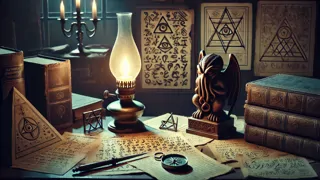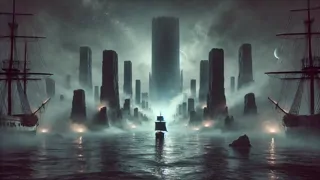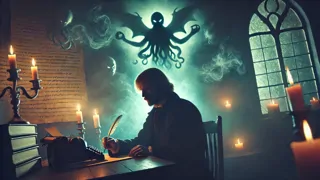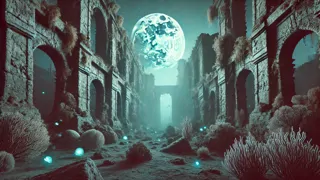Introduction
In the dimly lit study of my grandfather’s old mansion, I discovered a trove of antiquated manuscripts that would change the course of my understanding forever. The tome’s leather cover was cracked and slick with age, its symbols unreadable by any conventional language, yet somehow familiar in the recesses of my mind. Each brittle page exhaled the chill of a submerged tomb as I traced faded ink that seemed to shift beneath trembling fingertips. My grandfather’s annotations in the margins spoke of impossible geometry on coral-encrusted pillars submerged in an otherworldly ocean, and of dreams that guided explorers into nameless realms that defied Euclidean thought. He wrote with an urgent cadence, as though the act of writing might stave off an unnamable horror hovering at the edge of perception. Flickers of torchlight danced across the walls of that candlelit room as I turned each page, riveted by accounts of a hidden cult sworn to awaken an ancient god. With every word, a creeping dread settled in my chest like a cold anchor. I sensed that these were not mere superstitions of a bygone age, but warnings encoded in fevered script by scholars who knew that the veil between worlds could tear as easily as parchment. By the time the storm outside had reached its fiercest pitch, I understood that my life would be forever entwined with forces far older and more terrifying than human reason could contain. This is the record of that journey into the abyss, where reality bends and the call of Cthulhu resonates like a distant, underwater chorus that no mind can ignore.
Awakening the Depths
In the winter of 1926 I first encountered a fragment of the Cthulhu cult’s lore in a bundle of crumbling letters and faded photographs from my late granduncle. His name was Professor Angell, a revered anthropologist whose later research took him far from the safe halls of New England academia into darker domains. The box arrived in New Orleans amid a fog of spring humidity that made the streets glisten under flickering gas lamps. I opened the first brittle pages in my cramped hotel room beneath a single oil lamp illuminating curves of wrought-iron balcony rail. The letters spoke of vivid nightmares that shifted shapes in dreams like leviathans stirring beneath cold waves. They described nonhuman architecture in the Caribbean on forgotten islands where memory itself wavered like water against rock. The images included a relief carving of a monstrous figure half-octopus and half-dragon suspended among twisting columns, its eyes hollow with starless depths. Reading those descriptions unsettled me even as I felt an irrepressible pull deeper into that arcane lore. In one entry, Professor Angell warned of a cult whose adherents whispered names older than any living language, names that resonated on subconscious frequencies. He traced their presence to secret gatherings that spanned from the bayous of Louisiana to sunken ruins under Arctic ice. Each letter included a hastily drawn sketch of angular stone blocks carved in unknown glyphs, as though the very laws of perspective had been warped by an alien hand. The margin scrawls confessed in a trembling script that no mortal should ever awaken the sleeping powers they described. Reading further, I realized this was not scholarly curiosity but a summons from something ancient and patient. A voice older than any lore beckoned me toward horizons I barely dared imagine. Each night, that murmuring call grew louder, echoing beneath my breathing, hinting at cities slumbering in the deepest trenches of the ocean. I understood then that my journey into this forbidden realm was only beginning, and the threshold I crossed would mark me forever.

Shadows Over the Seas
Months later I awoke drenched in sweat after a dream of cyclopean gates slamming shut under boiling currents. In that dream I pressed my palm against a monolithic door carved with ornate spirals that pulsed with phosphorescent green light. A voice like crashing cymbals echoed from a cavern deeper than the ocean itself, promising revelations too vast for any human mind. I jolted awake to the stench of brine drifting in on the night air and an unfamiliar scratch on my cabin door. At dawn I discovered a slimy trail of luminescent residue curling across the wood floor, as though some unseen creature had passed through while I dreamed. Soon after, a telegram arrived from the coastguard—boats found adrift off the Gulf, crews missing, logbooks spattered with cryptic markings. The world I trusted, built on maps and schedules, began to unravel into a tapestry of oddities and fear. Determined, I shipped out to investigate on a weathered freighter bound for open waters. The voyage tested every fiber of endurance; storms roared with intelligence, and lightning revealed shapes beneath the waves—colossus limbs drifting in the phosphorescent gloom. Sailors muttered of songs rising from the depths and of cultists chanting in remote coves at midnight. I spent sleepless nights recording every detail, from the creak of the hull to the chorus of distant drums that echoed through steel decks. As supplies dwindled unnaturally fast and cabin fever set in, I sensed that the boundaries of reality were fraying like old canvas. The lookout’s scream on the fifth night remains etched in my memory: towering spires of black stone erupting from the mist, their impossible angles defying Euclidean reason. My journal entries end in frantic scrawl, for I realized the city of R’lyeh was no hallucination but a living nightmare beneath the sea, awaiting the day it would rise again from surgical depths to reclaim its dominion over land and sky.

The Dreamer’s Revelation
I must confess that what followed defied the boundaries of rational thought and common sense. The encounter at R’lyeh left every witness irrevocably changed, our memories bleeding into feverish visions that no scholar could catalog. I recorded what I could before the weight of that cosmic exposure unraveled my will. Upon returning to port, there was no sign of coral-encrusted towers or cyclopean plazas—only the familiar quays and gas lamps of a world that refused to recall its brush with oblivion. Sailors spoke of phantom ships that emerged briefly at distant harbors before vanishing again beneath undulating water. Rumors of remote temples hidden in rainforest canopies, where cultists summoned eldritch rites beneath moonless skies, trickled into every backroom tavern and university corridor. I consulted cryptographers who claimed to decode fragments of that alien tongue, only to collapse, pale and trembling, as the phrases echoed in their minds like ghostly lullabies. Night after night, dreams arose of sunken archways and vibrational hymns that stretched across oceans and centuries. I began fearing sleep itself, for each dream opened a door to a timeless abyss. Scholars who once mocked the mythos now whispered of wavering stars and inverted constellations in stale observatory dome sketches. I penned each testimony in a final volume bound in oilskin and sealed with black wax. Its title remains unwritten—left blank out of dread for what might yet slip through the crease of reality. Now, exiled and haunted by glimpses of that dreaming god, I sense the barrier between our realm and the cosmic deep fray with every passing season. This is my warning: some knowledge carries a price heavier than fear, and some doors, once opened, linger forever ajar, allowing the chorus of Cthulhu’s sleep song to seep into every fractured mind.

Conclusion
In the centuries since Professor Angell’s initial discoveries, whispers of Cthulhu’s looming return have persisted in every corner of human memory. We build tall walls of certainty and progress, yet below the surface, the abyss churns with a patience unfathomable to our brief mortal span. Though we cling to reason and science, the ancient rhythms of the deep march steadily towards their appointed hour. I write this final account in a moment of uneasy calm before the storm. Should the stars align once more, our world may find itself unmoored from its fragile moorings, cast into perpetual night under the gaze of that dreaming god. Preserve these words as a beacon against oblivion, for our fragile spark of consciousness may prove the only flame in the darkness. May these chronicles fortify your will, for in the face of such cosmic forces, courage becomes our most precious defense. Yet it is a fragile bulwark, easily shattered by the echo of primordial truths. If you find these pages, heed them well. Pray that the threshold between wakefulness and nightmare never falters, for in that gap lies our only hope of enduring the return of the Great Old Ones.


















